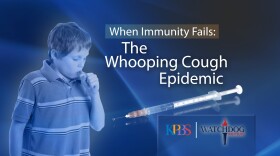For the past four months, KPBS and the Watchdog Institute have tracked the whooping cough epidemic across California and other affected states. In an effort to better understand who is getting sick, we examined data from San Diego County Health and Human Services agency that contained immunization history for each person diagnosed with pertussis. In September, KPBS reported that almost two-thirds of the people diagnosed with pertussis in San Diego County had been up to date on their immunizations. The figure surprised local health officials.
The institute then requested similar information from the California Department of Public Health. Each local health jurisdiction is responsible for reporting detailed information on probable pertussis cases to the state health department. The department keeps track of the information electronically and submits it to the Centers for Disease Control and Prevention (CDC).
In September, we received the state’s data on pertussis cases, and found it was not up to date and was missing information. For example, the immunization history was marked “unknown” for more than 60 percent of the cases. The state’s figures for San Diego County also didn’t match what the county had given us. We asked the state about the discrepancies, and officials responded that if we wanted timely and accurate information, we should ask each county’s health department.
Within days, we began requesting immunization history information from counties that reported high numbers of cases of pertussis. Of the 19 counties contacted, nine responded with immunization information. Officials from the other counties said they either didn’t have the data, or they cited patient privacy in withholding it.
The institute’s analysis of the data provided showed that in cases where immunization history is known, between 44 and 83 percent of the people diagnosed with whooping cough had been vaccinated.
A more recent set of data from the state showed the California Department of Public Health still does not have immunization history information for almost 70 percent of the reported cases. However, in cases where immunization history is known, 83 percent of the people diagnosed with pertussis had been immunized.
To better understand the current epidemic, reporters for KPBS and the Watchdog Institute traveled to Los Angeles, Sacramento and the Netherlands to interview the world’s leading experts on pertussis, health officials and vaccine experts. They also reviewed recent studies done on pertussis, interviewed local families about their experiences with the disease and filed California Public Records Act and federal Freedom of Information Act (FOIA) requests for information on the epidemic and efforts to respond to it.
The CDC recently stopped answering questions about ongoing studies of whooping cough and its response to outbreaks nationwide. The CDC still has not produced records in response to a FOIA request the institute filed in September for information relating to past whooping cough epidemics.







